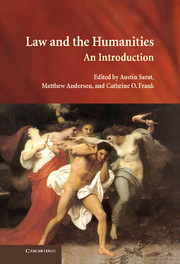Book contents
- Frontmatter
- Contents
- Contributors
- Acknowledgments
- Introduction: On the Origins and Prospects of the Humanistic Study of Law
- I PERSPECTIVES ON THE HISTORY AND SIGNIFICANCE OF SCHOLARSHIP IN LAW AND THE HUMANITIES: THREE VIEWS
- 1 A Humanities of Resistance: Fragments for a Legal History of Humanity
- 2 Three Tales of Two Texts: An Introduction to Law and the Humanities
- 3 Law, Culture, and Humility
- II IDEAS OF JUSTICE
- III IMAGINING THE LAW
- IV LINGUISTIC, LITERARY, AND CULTURAL PROCESSES IN LAW
- V INSTITUTIONAL PROCESSES
- Index
- References
3 - Law, Culture, and Humility
Published online by Cambridge University Press: 20 January 2010
- Frontmatter
- Contents
- Contributors
- Acknowledgments
- Introduction: On the Origins and Prospects of the Humanistic Study of Law
- I PERSPECTIVES ON THE HISTORY AND SIGNIFICANCE OF SCHOLARSHIP IN LAW AND THE HUMANITIES: THREE VIEWS
- 1 A Humanities of Resistance: Fragments for a Legal History of Humanity
- 2 Three Tales of Two Texts: An Introduction to Law and the Humanities
- 3 Law, Culture, and Humility
- II IDEAS OF JUSTICE
- III IMAGINING THE LAW
- IV LINGUISTIC, LITERARY, AND CULTURAL PROCESSES IN LAW
- V INSTITUTIONAL PROCESSES
- Index
- References
Summary
Hermeneutics seems to me to be animated by this double motivation: willingness to suspect, willingness to listen; vow of rigor, vow of obedience. In our time, we have not finished doing away with idols and we have barely begun to listen to symbols.
– Paul RicoeurIf there was a moment when the study of Law and Humanities came of age, it was at the 1989 Annual Meeting of the Association of American Law Schools. In a packed Grand Ballroom B, Margaret Jane Radin talked about how she uses the poetry of Wallace Stevens in her first-year law, language, and ethics course. Martha Minow read a poem by Adrienne Rich. James Boyd White talked about the Cathedral of Chartres and the generations of workmen who toiled in its construction without, of course, any expectation of ever seeing the completion of their handiwork. Law, I recall him saying, was a similar communal work of art that calls on us to engage with it in dialogue.
Or something like that…the synopsis in the meeting program was only marginally more helpful. It described the panel's subject as “that of personal and community wholeness, characterized by dialogue, the translation of disciplinary languages, and the grasping together of scattered realities.” In fact, I distinctly remember Martha Minow saying afterward that she had been on panels with White before and that still she had no idea what he was talking about.
- Type
- Chapter
- Information
- Law and the HumanitiesAn Introduction, pp. 98 - 122Publisher: Cambridge University PressPrint publication year: 2009
References
- 1
- Cited by



